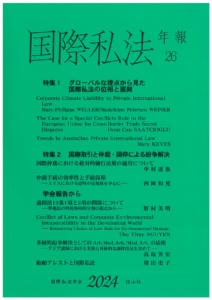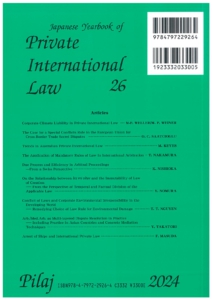Views
The EU Sustainability Directive and Jurisdiction
The Draft for a Corporate Sustainable Due Diligence Directive currently contains no rules on jurisdiction. This creates inconsistencies between the scope of application of the Draft Directive and existing jurisdictional law, both on the EU level and on the domestic level, and can lead to an enforcement gap: EU companies may be able to escape the existing EU jurisdiction; non-EU companies may even not be subject to such jurisdiction. Effectivity requires closing that gap, and we propose ways in which this could be achieved.
(authored by Ralf Michaels and Antonia. Sommerfeld and crossposted at https://eapil.org/)
- The Proposal for a Directive on Corporate Sustainability Due Diligence
The process towards an EU Corporate Sustainability Due Diligence Directive is gaining momentum. The EU Commission published a long awaited Proposal for a Directive on Corporate Sustainability Due Diligence (CSDDD), COM(2022) 71 final, on 23 February 2022; the EU Council adopted its negotiation position on 1 December 2022; and now, the EU Parliament has suggested amendments to this Draft Directive on 1 June 2023. The EU Parliament has thereby backed the compromise textreached by its legal affairs committee on 25 April 2023. This sets off the trilogue between representatives of the Parliament, the Council and the Commission.
No Sunset of Retained EU Conflict of Laws in the UK, but Increased Risk of Sunburn
By Dr Johannes Ungerer, University of Oxford
The sunset of retained EU law in the UK has begun: the Retained EU Law (Revocation and Reform) Act 2023 received Royal Assent at the end of June. The Act will revoke many EU laws that have so far been retained in the UK by the end of 2023.
The good news for the conflict of laws is that the retained Rome I and II Regulations are not included in the long list of EU legal instruments which are affected by the mass-revocation. Both Regulations have been retained in the UK post-Brexit by section 3 of the European Union (Withdrawal) Act 2018 and were modified by the Law Applicable to Contractual Obligations and Non-Contractual Obligations (Amendment etc.) (EU Exit) Regulations 2019 (as amended in 2020). The retained (modified) Rome I and II Regulations will thus be part of domestic law beyond the end of 2023. Yet this retained EU law must not be called by name anymore: it will be called “assimilated law” according to section 5 of the Retained EU Law (Revocation and Reform) Act 2023 (although the title of this enactment, like others, will strangely continue to contain the phrase “Retained EU Law” and will not be changed to “Assimilated Law”, see section 5(5)).
The CJEU on Procedural Rules in Child Abduction Cases: private international law and children’s rights law
Comment on CJEU case Rzecznik Praw Dziecka e.a., C-638/22 PPU, 16 February 2023)
Written by Tine Van Hof, post-doc researcher in Private International Law and Children’s Rights Law at the University of Antwerp, previously published on EU live
The Court of Justice of the EU has been criticised after some previous cases concerning international child abduction such as Povse and Aguirre Zarraga for prioritising the effectiveness of the EU private international law framework (i.e. the Brussels IIa Regulation, since replaced by Brussels IIb, and the principle of mutual trust) and using the children’s rights law framework (i.e. Article 24 of the EU Charter of Fundamental Rights and the principle of the child’s best interests) in a functional manner (see e.g. Silvia Bartolini and Ruth Lamont). In Rzecznik Praw Dziecka the Court takes both frameworks into account but does not prioritise one or the other, since the frameworks concur.
News
Out Now: The 26th Volume of the Japanese Yearbook of Private International Law (2024)


The 26th Volume of the Japanese Yearbook of Private International Law (Kokusai Shiho Nenpo) published by the Private International Law Association of Japan (Kokusai Shiho Gakkai) (hereinafter “PILAJ”)has recently been released.
This new volume features the following table of content (all links direct to the papers’ English abstracts)
Part 1 – The Status and Development of Private International Law from a Global Perspective
Corporate Climate Liability in Private International Law (in English)
Marc-Philippe WELLER and Madeleine Petersen WEINER Read more
ILA Committee on Alternative Dispute Resolution (ADR) Call for Papers
The International Law Association Committee on Alternative Dispute Resolution (ADR) has issued a Call for Papers for a conference scheduled for 7 April 2025 titled ‘Shaping Appropriate ADR in International Law’. Further information is available here. The deadline for submissions is 5 February 2025.
Workshop on Addressing Conflict of Laws and Facilitating Digital Product Passports
UN/CEFACT would like to invite you to attend: The 5th Working Group Meeting on Addressing Conflict of Laws and Facilitating Digital Product Passports in Cross-Border Value Chain: –19 Mar 7-8:00 pm (Sydney Time), Dr. Fabian Sack, Sydney University (Zoom): Life cycle assessment For the zoom link and previous meeting minutes, please refer to the project […]


